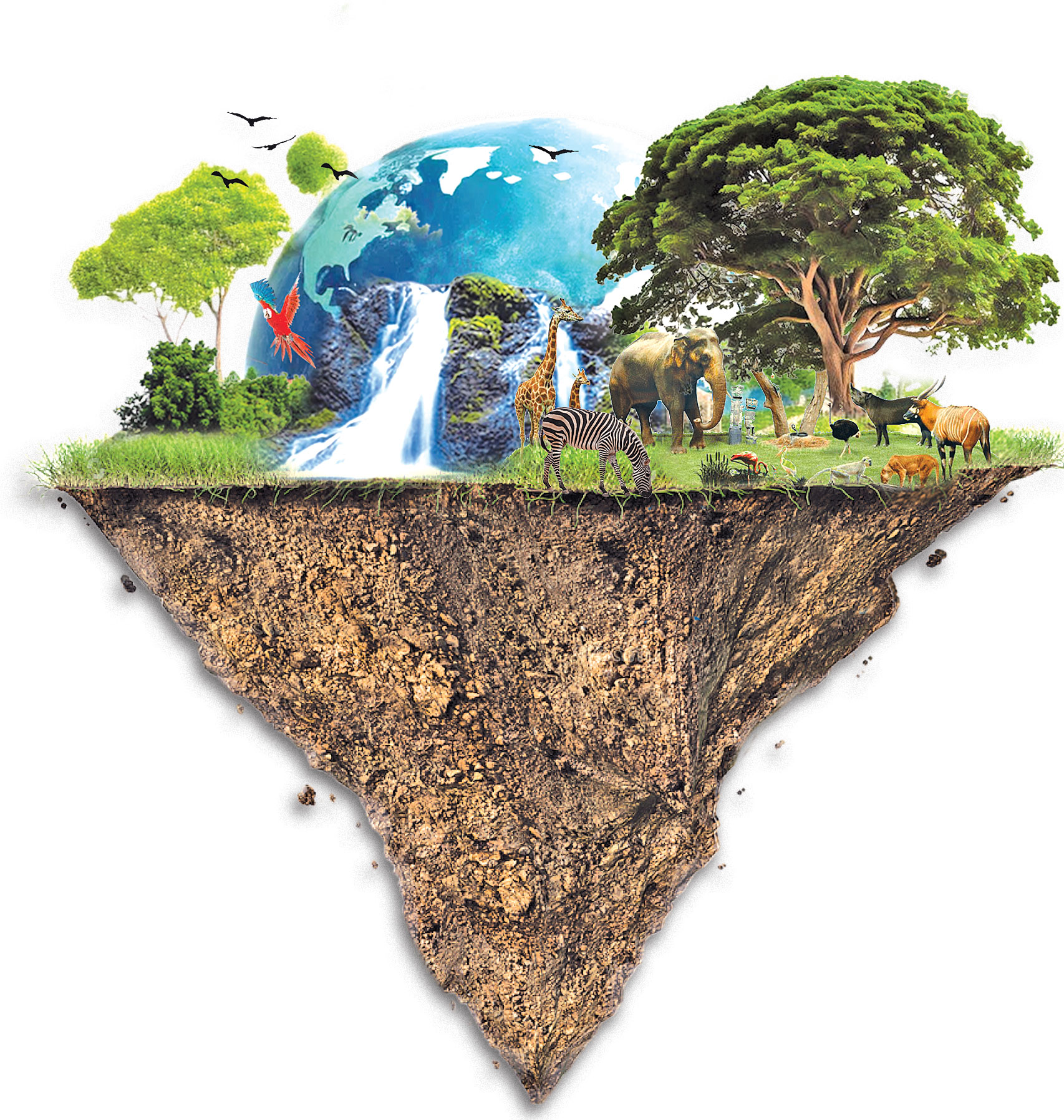Print: 28 Oct 2025
Dr Kanan Purkayastha
On 5 June World Environment Day (WED) will be celebrated around the globe led by the United Nation Environment programme (UNEP). This year theme of the day is #beatplasticpollution. This year WED is hosted by Jeju Island in the republic of Korea. Jeju Island is selected as the host site, because in 2022, it declared its ambition to be a plastic-zero Island by 2040 and has demonstrated various efforts to end plastic pollution. Inger Andersen, Executive Director of the UNEP stated, “Jeju’s efforts towards a future without plastic pollution align with the goals of WED 2025.” “Jeju’s pristine natural scenery and innovative environmental policies will inspire action for environmental protection,” he further added.
In 1907, when Belgian chemist Leo Baekeland first discovered the synthetic plastic named Bakelite by combining two chemicals, formaldehyde and phenol, under heat and pressure, he did not realise that this will spark a consumer boom. Soon it became a useful material for the production of telephone, radio and camera. In the early decades of the 20th century, the petroleum and chemical industries began to form alliances. These alliances were driven by the desire to make use of waste material from processing crude oil and natural gas. These companies are still the major producers of raw material for the plastics industry today.
More plastic production leads to the more use of fossil fuel. This leads to more emission of carbon dioxide in the atmosphere. Also, plastic products create greenhouse gas emissions across their whole lifecycle. Statistics suggest that if no action is taken, greenhouse gas emissions caused by plastic could account for 19% of the Paris Agreement’s total allowable emissions in 2040.

Statistics further suggests that the world is producing approximately 460 million tonnes of plastic annually. Steps towards the creation of a circular economy, where resources can be recycled and reused is modest. For example, less than 10 per cent of total produced plastic is recycled. Annually 19-23 million tonnes end up in lakes, rivers and seas. It is estimated that 80% of plastics in the ocean were used on land. Ocean plastic does huge damage to the marine ecosystem. Plastic bags have been found in the Marianna Trench at the bottom of the deepest ocean and there is even a waste dump located 8.6 kilometres above sea level on mount Everest.
One of the main problems from plastic pollution is micro-plastics, which is a tiny plastic particle up to a 5 mm of diameter, which can end up into food, water and air. It has been observed that by discarding or burning plastic caused harms to human health, biodiversity and polluting every ecosystem of the planet.
In 2022, 175 UN Member States endorsed a historic resolution to end plastic pollution and forge an international legally binding agreement. This is the most significant environmental multilateral deal since the Paris accord, which has taken into account the full life cycle of plastic. This resolution recognises among other matters pertaining to plastic pollution: “The wide range of approaches, sustainable alternatives and technologies available to address the full life cycle of plastics, further highlighting the need for enhanced international collaboration to facilitate access to technology, capacity-building and scientific and technical cooperation, and stressing that there is no single approach.”
The first session of the Intergovernmental Negotiating Committee (INC) took place in Uruguay from 28 November to 2 December 2022. The second session of the INC to develop an international legally binding instrument on plastic pollution, including in the marine environment held from 29 May to 2 June 2023 at the United Nations Educational, Scientific and Cultural Organization (UNESCO) Headquarters in Paris, France. In the last session of the intergovernmental negotiating committee of the UN plastics treaty, held in Bulsam, South Korea end of last year, it was recognised that global awareness about the importance of ending plastic pollution is of paramount importance. Bangladesh previously pointed out in their statement at INC that “since downstream countries manage the cumulative plastic pollution, they could be supported with special multi-lateral fund.” This is a very relevant issue for Bangladesh because of her geo-political reality in the delta region.
World Environment Day is a reminder that as climate change and its impacts continue to affect us all, we must find sustainable ways of living and working in order to reduce habitat loss, pollution and protect our planet for future generations. Single-use plastic is clearly a threat to the environment. The biggest challenge in getting rid of plastic is resistance from the plastics and petrochemical industries. So, as an individual we should stop using single-use plastic.
Above all, the extraction of natural resources used to feed our material consumption is an important driver of ecological decline and climate change. Most of our consumption generates waste. Millions of tonnes of plastic that flow into the water stream end up into the ocean each year. This is now literally a planet-wide phenomenon. Plastic pollution should be seen as a global problem. We need to think about it globally, but we need to act locally. Hence special multilateral funding for tackling the problem in the delta region is very pertinent.
__________________________________________________________
The writer is a UK based academic who writes on science, philosophy and education
More From World Environment Day
More From World Environment Day
Plastic Pollution: A Planet-wide Phenomenon

Dr Kanan Purkayastha
On 5 June World Environment Day (WED) will be celebrated around the globe led by the United Nation Environment programme (UNEP). This year theme of the day is #beatplasticpollution. This year WED is hosted by Jeju Island in the republic of Korea. Jeju Island is selected as the host site, because in 2022, it declared its ambition to be a plastic-zero Island by 2040 and has demonstrated various efforts to end plastic pollution. Inger Andersen, Executive Director of the UNEP stated, “Jeju’s efforts towards a future without plastic pollution align with the goals of WED 2025.” “Jeju’s pristine natural scenery and innovative environmental policies will inspire action for environmental protection,” he further added.
In 1907, when Belgian chemist Leo Baekeland first discovered the synthetic plastic named Bakelite by combining two chemicals, formaldehyde and phenol, under heat and pressure, he did not realise that this will spark a consumer boom. Soon it became a useful material for the production of telephone, radio and camera. In the early decades of the 20th century, the petroleum and chemical industries began to form alliances. These alliances were driven by the desire to make use of waste material from processing crude oil and natural gas. These companies are still the major producers of raw material for the plastics industry today.
More plastic production leads to the more use of fossil fuel. This leads to more emission of carbon dioxide in the atmosphere. Also, plastic products create greenhouse gas emissions across their whole lifecycle. Statistics suggest that if no action is taken, greenhouse gas emissions caused by plastic could account for 19% of the Paris Agreement’s total allowable emissions in 2040.

Statistics further suggests that the world is producing approximately 460 million tonnes of plastic annually. Steps towards the creation of a circular economy, where resources can be recycled and reused is modest. For example, less than 10 per cent of total produced plastic is recycled. Annually 19-23 million tonnes end up in lakes, rivers and seas. It is estimated that 80% of plastics in the ocean were used on land. Ocean plastic does huge damage to the marine ecosystem. Plastic bags have been found in the Marianna Trench at the bottom of the deepest ocean and there is even a waste dump located 8.6 kilometres above sea level on mount Everest.
One of the main problems from plastic pollution is micro-plastics, which is a tiny plastic particle up to a 5 mm of diameter, which can end up into food, water and air. It has been observed that by discarding or burning plastic caused harms to human health, biodiversity and polluting every ecosystem of the planet.
In 2022, 175 UN Member States endorsed a historic resolution to end plastic pollution and forge an international legally binding agreement. This is the most significant environmental multilateral deal since the Paris accord, which has taken into account the full life cycle of plastic. This resolution recognises among other matters pertaining to plastic pollution: “The wide range of approaches, sustainable alternatives and technologies available to address the full life cycle of plastics, further highlighting the need for enhanced international collaboration to facilitate access to technology, capacity-building and scientific and technical cooperation, and stressing that there is no single approach.”
The first session of the Intergovernmental Negotiating Committee (INC) took place in Uruguay from 28 November to 2 December 2022. The second session of the INC to develop an international legally binding instrument on plastic pollution, including in the marine environment held from 29 May to 2 June 2023 at the United Nations Educational, Scientific and Cultural Organization (UNESCO) Headquarters in Paris, France. In the last session of the intergovernmental negotiating committee of the UN plastics treaty, held in Bulsam, South Korea end of last year, it was recognised that global awareness about the importance of ending plastic pollution is of paramount importance. Bangladesh previously pointed out in their statement at INC that “since downstream countries manage the cumulative plastic pollution, they could be supported with special multi-lateral fund.” This is a very relevant issue for Bangladesh because of her geo-political reality in the delta region.
World Environment Day is a reminder that as climate change and its impacts continue to affect us all, we must find sustainable ways of living and working in order to reduce habitat loss, pollution and protect our planet for future generations. Single-use plastic is clearly a threat to the environment. The biggest challenge in getting rid of plastic is resistance from the plastics and petrochemical industries. So, as an individual we should stop using single-use plastic.
Above all, the extraction of natural resources used to feed our material consumption is an important driver of ecological decline and climate change. Most of our consumption generates waste. Millions of tonnes of plastic that flow into the water stream end up into the ocean each year. This is now literally a planet-wide phenomenon. Plastic pollution should be seen as a global problem. We need to think about it globally, but we need to act locally. Hence special multilateral funding for tackling the problem in the delta region is very pertinent.
__________________________________________________________
The writer is a UK based academic who writes on science, philosophy and education





